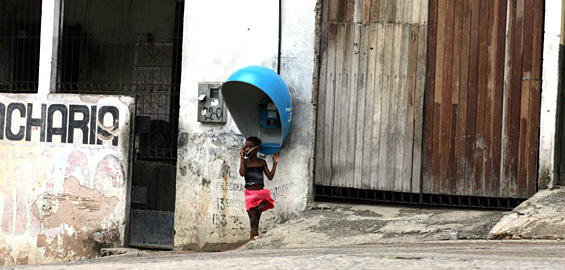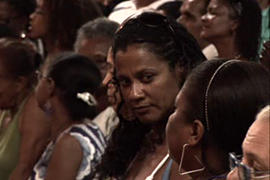Obama inspires Afro-Brazilians
A poor and marginalised people find hope in a US president of African origin.

 |
| Income disparity in Salvador is stark, with power largely in the hands of non-blacks [GALLO/GETTY] |
It is likely that no group of people anywhere in South America are watching the rise of Barack Obama as the first black US president as passionately as in Salvador, Brazil.
Salvador, on the northeast coast of the country, is Brazil’s third largest city with about 2.8 million inhabitants, over 80 per cent of whom are defining themselves as black of mixed race.
Most people from the city are direct ancestors of the first four million slaves who were taken to the city in the 16th century from what is modern-day Nigeria.
Salvador was the main entry point for slaves for the entire region, and was the colonial capital of Brazil until 1763.
| In depth | ||||||||||||||||

Focus
Your Views
|
And today, it retains a strongly African feel, with the food, culture, and music drawing hundreds of thousands of tourists each year.
Condoleezza Rice, the first African-American woman to hold the position of US secretary of state, visited the city earlier this year and an increasing number of African-Americans are visiting Salvador to explore their ancestral roots.
Candomble, the original religion brought from Africa, is still widely practiced despite the fact most slaves were forced to convert Catholicism.
And on any given Tuesday night a centuries-old church called Nossa Senhora de Rosario dos Pretos (Our Lady of the Rosary of the Blacks) overflows with locals singing, sometimes in the Yoruba African language, and taking part in traditional dances.
Most people here say Obama’s victory will affect the children of the city in a number of ways, but not just because he is black.
“Obama is not president because he is black, he is president because of the power of his proposals,” said Cesar Souza, who teaches African dance at a school for poor black children.
“And that is an example to every black kid from poor areas in the world that he or she can grow up and go to school, a university, and have goals. These kids will watch television and see Obama and be curious now. So Obama will be a positive reference for people in Brazil – especially black children.”
Political hopes
Salvador is the capitol of the state of Bahia, a particularly poor region where income disparity is stark and political power consolidated in the hands of the non-black ruling elite.
According to official statistics, 40 per cent of the population lives at or below minimum wage level while less than one per cent earns more than 20 times the minimum wage.
None of Salvador’s political elite are black, so many here see Obama’s victory as a model to achieve political power.
 |
| About half of Brazil’s 190 million population consider themselves black or of mixed race |
“In Salvador more than 80 per cent of the population is black, and we live in the worst conditions,” said Marcos Rezende, a young community organiser who was watching the US election results come in with several dozen others on television on Tuesday.
“The victory of Barack Obama has immense importance for us because all our local black candidates in the elections always lose.
“He has shown us black people we can bring this kind of influence in holding political power in the future, that yes we can also govern anywhere in the world”.
Brazil has never had a black president of its own, despite the fact that 47 per cent of the 190 million Brazilians define themselves as black or of mixed race.
“Obama is not only going to influence the US, he will influence the politics around the world – and especially here in Brazil,” said Lindinalva de Paula, who was also watching Tuesday night’s results on local television.
“For the black community here, it represents advancement for us as well – and makes us think seriously of the possibility in Brazil of having a black president.”
On November 20 Brazil will celebrate the National Day of Black Awareness – and at least here in Salvador – given the new president of the US – this year that will take on a little extra significance.
“Black children that do not understand politics now see Obama as president on the TV and realize that someone of their colour is president of the most powerful country in the world,” says Rezende.
“These kids will say, ‘I want to do it too. I can do it. I hope to be the president of Brazil.'”
